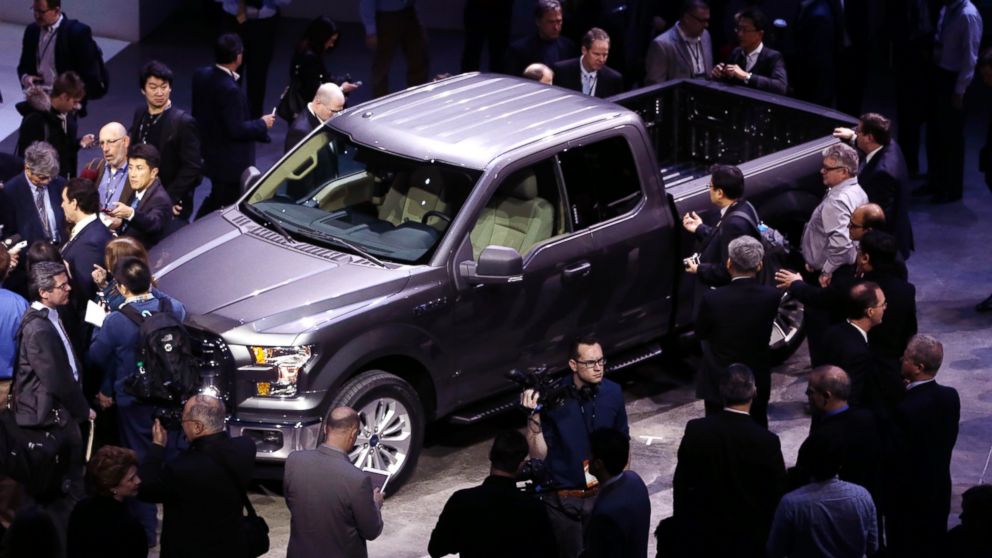The New Ford F-150: Why Superman Wasn't Called the Man of Aluminum
The new Ford F-150 has a body made out of aluminum, but is it better than steel?

Jan. 14, 2014 — -- Will the new 2015 Ford F-150 truck unveiled at the Detroit Auto Show persuade truck buyers that aluminum is "Built Ford Tough" and better than steel?
While some drivers may not care what comprises the inner body of their vehicles, car manufacturers like Ford are carefully crafting a story that will convince Superman himself of the benefits of aluminum in crashes and for heavy loads.
Alec Gutierrez, senior analyst for Kelley Blue Book, said significant advancements have been made in the construction of aluminum alloy over the past several years.
"They don't call Superman 'the man of aluminum,' but they also don't call him 'the man of carbon fiber,' another light weight and strong material," Gutierrez said. "Perhaps Superman needs to evolve as technology advancements allow for lighter and stronger materials."
The new F-150 truck introduced on Monday has a series of 11 new bells and whistles, most notably an 8-inch productivity LCD screen and an aluminum alloy body and bed, which cuts 500 to 700 lbs from the top-selling truck.
"While at the end of the day, steel may be more durable overall, the use of aluminum in the engine block and other parts of the frame have allowed Ford to save weight while maintaining the existing ruggedness, towing capacity, and performance stats of the existing truck," Gutierrez said.
Ford says there is still steel in the frame, which it calls "all-new" with "more high-strength steel than ever." The company says that its new "military-grade, aluminum alloys" used in Hummers and Bradleys improve "dent and ding resistance," in addition to saving weight.
Gutierrez says only time will tell if aluminum will prove to be as durable as steel in the long run, but Ford appears confident that their new trucks will deliver based on the upgrades.
"Overall, up to 700 pounds of weight have been saved, helping the F-150 tow more, haul more, accelerate quicker and stop shorter, and contributing to efficiency," Ford says in a statement about the new truck.
On sale later this year, the truck will be available in five primary "trims": XL, XLT, Lariat, Platinum and King Ranch.
Jonny Lieberman, Motor Trend senior features editor, said the truck is just a sign of more aluminum things to come.
In Photos: Who's the 'Winner' of the Detroit Auto Show?
With higher Corporate Average Fuel Economy standards coming, regulated by the National Highway Traffic Safety Administration, it's no longer logical to use steel for car bodies, Lieberman said.
"BMW is tackling this problem with their i line by building cars out of carbon fiber," he said, adding that Jaguar and Audi, among other manufacturers, have long employed aluminum as a lightweight alternative to steel.
Ford's chief operating officer Mark Fields acknowledged that working with aluminum was more expensive than steel.
"But given the volume we are working with, we will find some efficiencies," Fields said, according to the Los Angeles Times.
Brian Johnson of Barclays Capital estimates Ford earns about $11,000 on a pickup truck sale compared to $5,000 for a car, the Los Angeles Times reported, and the F-Series trucks comprises nearly half of Ford's North American profits.
With the F-150 as its breadwinner, Ford is in "the unique position of fully exploiting their economies of scale" of the truck, Lieberman said.
"Substantially lowering a vehicle's weight increases the performance and the mileage. If the costs can be kept in check, and if repairs are reasonable, Ford has a definite winner on its hands," Lieberman said.
Meanwhile, GM, which won this year's North American Truck of the Year for the Chevrolet Silverado, is sticking by the strengths of steel.
"We use aluminum on the hoods and certain engine blocks and in all the appropriate places," Roger McCormack, director of Buick/GMC marketing as General Motors, told the Los Angeles Times. "There are a lot of advantages of high strength steel — great structural integrity."




